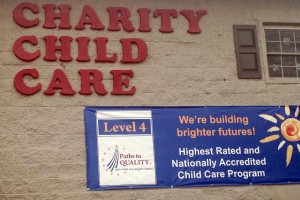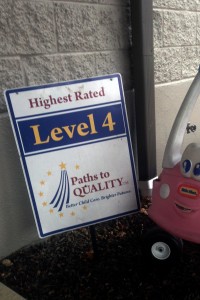When It Comes To Quality Pre-K, Indiana Providers Want More

Charity Child Care, a provider in Indianapolis, is a Level 4 on the Paths To Quality system. Charity teachers worked with Tikila Welch, a PTQ coach, to get their national accreditation. (Photo credit: Claire McInerny/StateImpact Indiana)
If you are a parent, you know the battle with childcare: cost, quality and availability, to name a few. The state tries to make navigating that process simpler with its Paths to QUALITY ranking system for childcare and preschool providers.
It’s voluntary, but the number of providers seeking a ranking is increasing. Part of that is tied to an increase in federal funding and some of it has to do with the state’s preschool pilot program, which requires providers who accept the scholarships to be at a Level 3 or 4 on the Paths to QUALITY system.
What High Quality Preschool Looks Like
It’s music class at Wayne Township Preschool in Indianapolis, and a group of three- and four-year-olds are sitting on a carpet facing their teacher, copying her hand motions as they sing along. It resembles playtime, but principal Kathryn Raasch is quick to point out the children are learning skills that are important for their education.
“It’s all language skills, everything they do in here,” Raasch says. “Plus it’s math, repetition, repeating it’s all part of that. Music is so inclusive with all of that, plus in here we work on social-emotional skills.”
A focus on skill development is what makes Wayne Township Preschool a Level 3 on the Paths to QUALITY scale.
- Measuring Quality When It Comes To Preschool In IndianaThe state’s Paths To Quality ranking system measures the effectiveness of preschool programs in Indiana, and the number of providers seeking this ranking is increasing.Download
Every activity the children do throughout their day is part of the school’s curriculum: children share things they wish for as a teacher writes it down, they describe the items to practice color recognition and the rest of the children sit silently listening to their classmates. All of these cognitive and social skills are part of the required curriculum for a Level 3 and 4 provider, which participants in On My Way Pre-K will experience starting in January.
How A Provider Gets On PTQ
The Paths To QUALITY system is divided into four levels, with higher levels requiring more of the providers. Here’s an overview of the requirements for each level:
Level 1
Meets basic health and safety standards.
If a center is certified through the state, they are qualified for Level 1.
Level 2
Level 1 requirements are met.
25 percent of teaching staff have a Child Development Associate (CDA).
Classroom is equipped with a variety of educational materials.
Clear goals for the child’s learning are in place.
Level 3
Levels 1 and 2 requirements are met.
50 percent of teachers have a CDA or other credentials.
A written curriculum is in place.
More rigorous requirements for learning and cognitive activities.
Level 4
Levels 1, 2 and 3 requirements are met.
Nationally accredited.
(Click here to search through the FSSA’s database of Paths To QUALITY providers)

To reach Level 4 status, a provider must be nationally accredited. (photo credit: Claire McInerny/StateImpact Indiana)
Moving onto the Paths to QUALITY system takes a lot of paperwork, and in some cases structural and employee improvements. So why are the number of providers going through the process increasing?
For one, it provides more assurance to families that their kids are in a quality program. There’s also money on the line. At each level on Paths to QUALITY, a provider gets money from the state for educational materials – the higher the level, the larger the check.
“The idea is that the coach will work with the provider to determine what will you need to get to the next level of PTQ and how can we use those dollars to get those materials to you,” says Mike Bachman, Director of Programs at the Indiana Association of Education for Young Children. “Anything from educational puzzles, to sensory centers, science centers, building up classroom materials.”
Getting on the system to gain these incentives takes a lot of work.
The Education Hurdle
Tikila Welch is a Paths To QUALITY coach, working with centers wanting to achieve Level 1 or 2 status. Both she and Bachman agree the most challenging part of the process is the education requirements for staff.
“You don’t have to have a credential to work in childcare,” Welch said. “It’s basically like ‘I’m looking for employment,’ and if you can meet the requirements as far as pass a background check, pass the TB test, pass the physical, then you can work in childcare.”
But Paths to QUALITY requires a certain percentage of a center’s staff have an early learning certificate or degree, depending on the level. That means many teachers have to go back to school. Welch says a big part of her job is making sure the directors and teachers understand that commitment.
“We try to help the directors through incentives to get the staff to come to those trainings,” Welch says. “We as the mentors go in to offer training, sometimes it’s during lunchtime, and sometimes it’s after hours.”
This was definitely the challenge at Wayne Township, where Raasch says many of her long time teachers got a scholarship from the state to spend their free time working on certification.
“Everybody went for it, it was really interesting,” Raasch says. “We knew that it would also ensure quality for our three-, four- and five-year-olds. But when you think about some of these ladies that are later in the stage of their career to be able to go back to college, I give credit to them to take that on.”
There’s been a big push recently for providers to get on board with the system or improve their ranking, because of the state’s new preschool pilot program. Centers in the five chosen counties, including large cities such as Indianapolis, Fort Wayne and Evansville, are trying to improve their ranking to a Level 3 or 4 so they can accept children using the scholarships.
The pilot is one of the reasons Raasch says her center wanted to be a Level 4. There is a large number of low-income kids in Wayne Township not receiving preschool and being a Level 4 could help the center’s chances of being chosen as one of the providers in the pilot. of
“When Wayne Township Preschools becomes a PTQ Level 4 you will see the teachers running down the hall running and screaming ‘yay we did it!’”
Until then, the screaming and yelling will be left to the preschoolers.